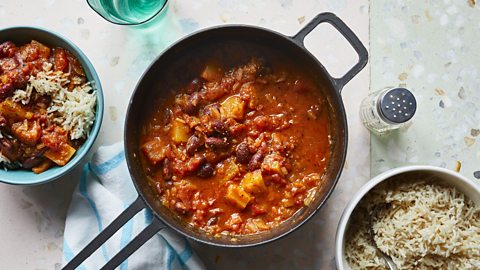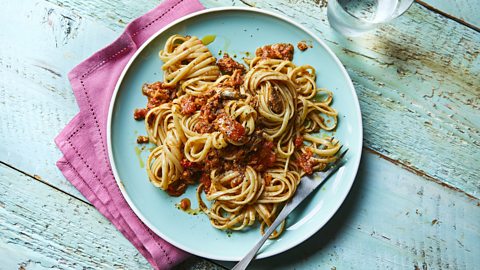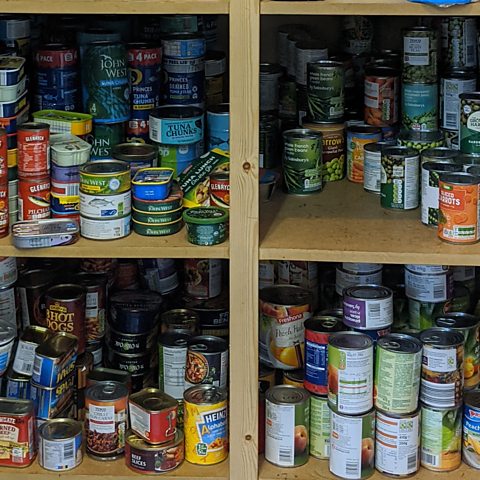‘I once lived almost entirely on tins of food’

Ten years ago, mum Jack Monroe had to turn to a food bank to feed herself and her toddler son. She knows what it’s like to have just £10 a week for food. Today, she describes herself as “sort of the nation’s home economics teacher”, on a mission to help people struggling to eat on a very tight budget. Often, this means cooking with tinned food.
She has become an expert in making very little money stretch to create healthy meals. Her cookbooks use cheap, simple ingredients: “I start with the worst possible version of every ingredient and make something delicious out of it. Then if you can afford better, the recipe is going to be even nicer – but if you can’t, and a lot of people can’t – that’s ok. I wanted to make people feel a little less ashamed of that.”

So what are Jack’s tips for learning to cook?
Jack advises that you allow yourself plenty of time to learn to cook. After cooking a disastrous lamb stew for the father of her child, she started to pay more attention to cooking. “If I cocked something up I would try to fix it and I would teach myself to cook. It took a month or so before I really hit my stride and then something clicked. No-one gets in a car and instinctively knows how to drive it! I’ve got no embarrassment that I was an absolutely terrible cook in my teens, because I think we’ve established I’ve learned my way out of that!”
It’s really important to find a recipe source you can trust, she says. She triple tests her recipes, “I understand that if you have no money you can’t risk trying something that might not work, because you can’t throw it in the bin and make something else. I’ve tried my best to make sure recipes are simple and delicious and that they work – I want to take that risk factor out for people.”
How do you cook well with tins?
Tins tend to be inexpensive, so are great if you’re cooking on a budget. ‘If you’re cooking with tins, try to make something familiar’, says Jack.
"Things like lentil bolognese. So instead of using mince, you can use half mince, half canned lentils. So it’s close to something you recognise, or can cook. It’s taking something tried and tested and making it out of unconventional ingredients. The concept is the same, it’s as delicious but you’ve got to let go of things you think you know,” she says.
You can get a surprising amount of variety from tinned foods, and it’s important to have the confidence to mix and match, according to Jack. To write her book, ‘Tin Can Cook’, she bought one tin of every food in the supermarket and sorted them into proteins, carbs, fruit and veg, and miscellaneous. “I would sit there and basically, like playing a fruit machine, grab something off each shelf and work out if I could make a meal from it. I wanted to give people the confidence to create things with what they have in their cupboards.”
Try adding tinned fruit to savoury dishes
Tinned food doesn’t always look the most appetising, but you need to go in with an open mind, according to Jack. As an example of successfully mixing and matching, she reveals she was once faced with a tin of stewed steak, a tin of black beans, a tin of chopped tomatoes and a tin of mandarins. “Stewed steak looks grim, there’s no two ways about it. It’s delicious in recipes, but when you open it, you’re like ‘what am I doing?!’”.
“I poured them all in a saucepan and it looked like someone had thrown it up outside a nightclub at 2am. I thought, ‘I’m going to add some basic spices and walk away from it. I came back into the kitchen half an hour later, and the stewed steak had fallen apart and the gravy had mixed with the tomatoes to make a rich sauce and the black beans had broken down and the mandarins had shredded and dispersed throughout.” And the recipe ‘Something like a feijoada’ was born.

On using the cheapest ingredients
Don’t always feel you have to stick rigidly to a recipe, says Jack. “I wanted to do something subversive and say, do you know what, if you’ve got a tin of tomatoes and a tin of sardines in the cupboard you can just add a bit of chilli to that and make something like a puttanesca.”
Jack tells people they can use vegetable oil in a salad dressing instead of olive oil, and that if they use long-grain rice in risotto instead of risotto rice, it’s 95 percent as good for a quarter of the price.


On making the recipes available to food bank users
“I know full well that when I was a food bank user I didn’t have money to drop on a cookbook.” So Jack decided to crowdfund to raise money to get one copy of the book to every food bank so they could photocopy it. “That crowdfunder raised enough money to send 10,000 copies of ‘Tin Can Cook’ to go to food banks, so they could go to individual people.” The crowdfunder is still in place and will continue to send copies of the book to food banks.
Jack is passionate about supporting food banks. “As an individual we can feel powerless – it can feel overwhelming. But actually everything that goes in a food bank box is helpful to somebody. Every donation to a food bank is helpful to somebody. And it’s these little things we do, whether that’s raising awareness by telling peoples’ stories, making a food donation, volunteering time, whatever it is, it goes some way to alleviating the very real suffering of another human being.”

Quick tips on how to store tins and jars, and how to use up leftovers